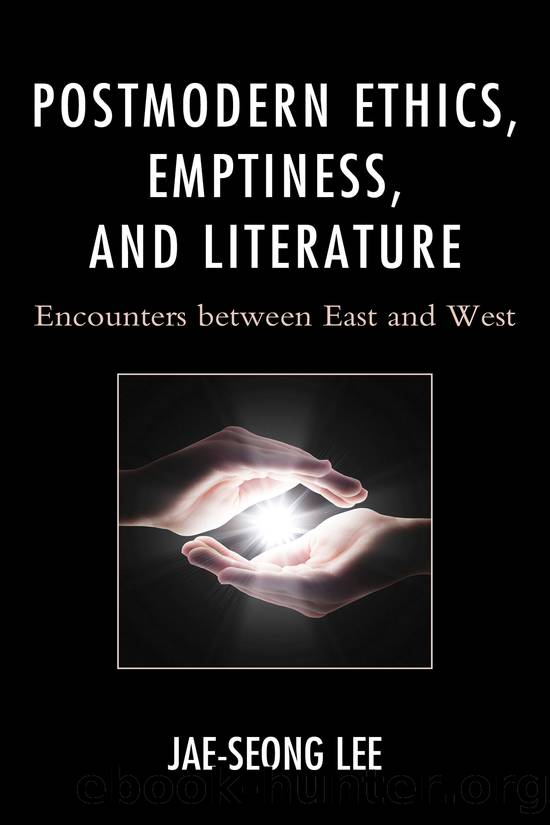Postmodern Ethics, Emptiness, and Literature by Lee Jae-seong;Sussman Henry;

Author:Lee, Jae-seong;Sussman, Henry;
Language: eng
Format: epub
Publisher: Lexington Books/Fortress Academic
Chapter V
A Process of Awakening in a Religious Narrative
The Book of Job
The Book of Job, an Ancient Western Religious Text that Leads Us to God as the Absolute Other
This chapter is meant to bridge the previous theory sections and the next literary reading parts. This chapter is the first of three chapters where I demonstrate how the theory I have elaborated on in the preceding four chapters would actually work for literary reading by dealing with one religious narrative and two major Gothic novels. I have discussed so far that literary reading leads us, through the experience of the sublime, to glimpse the wholly outside of our subjectivity, and that the outside is the dimension of ethical consciousness toward and for the absolutely heterogeneous Other. My investigation of the ultimate enlightenment in MahÄyÄna Buddhism was meant to serve the purpose of illuminating the ultimate reality more. Before the sections on further literary texts, this chapter investigates the nonontological, or nonempirical, ground deeply by dealing with a part of the Christian and Jewish Bible from in the light of ethics and the Buddhist perspective. As I demonstrate with a reading of the Book of Job, a Western religious text, I go on to elaborate that the ultimate goal of the Christian text is the same as that of ethics and Buddhism. Despite the fact that it is part of the Old Testament, the Book of Job seems to make the best âliteraryâ text of all the books in both Old and New Testaments. This reading is neither meant to conform to religious doctrines nor present the story as a part of the history of ancient Israel. Reading the story of Jobâs suffering as a literary text would manifest that we readers are drawn to God as the absolute Otherânot the traditional, logocentric concept of God but the ultimate reality. This reading shows that the absolute Other or ultimate reality is Emptiness as fullness in MahÄyÄna Buddhism.
Unlike any other Biblical text, the Book of Job explores the reason for human suffering caused by evil. While God puts Job the protagonist to the practically insufferable test, Jobâs question for God throughout the whole text is why he, a religiously and morally right man, has to suffer. Job is a man that represents anyone who suffers for no acceptable reason. The first sentence of the text tells us that Job is âblameless and uprightâ (The Book of Job 1:1).1 From a traditional religious point of view, this story consists of a very ironic, even enigmatic, situation because Job, who is now going through the suffering, has been a thoroughly loyal servant to his Master. As God appears to Job later in the story, He gives Job no plain answer, and there is only some non-verbal, transcendent encounter between them. What was done between the two can never be understood with the literary device of poetic justice in which piety is rewarded and impiety punished. This text boldly questions the conventional way of believing in
Download
This site does not store any files on its server. We only index and link to content provided by other sites. Please contact the content providers to delete copyright contents if any and email us, we'll remove relevant links or contents immediately.
The Power of Myth by Joseph Campbell & Bill Moyers(925)
Half Moon Bay by Jonathan Kellerman & Jesse Kellerman(911)
A Social History of the Media by Peter Burke & Peter Burke(883)
Inseparable by Emma Donoghue(844)
The Nets of Modernism: Henry James, Virginia Woolf, James Joyce, and Sigmund Freud by Maud Ellmann(740)
The Spike by Mark Humphries;(719)
A Theory of Narrative Drawing by Simon Grennan(707)
The Complete Correspondence 1928-1940 by Theodor W. Adorno & Walter Benjamin(705)
Ideology by Eagleton Terry;(659)
Bodies from the Library 3 by Tony Medawar(649)
Culture by Terry Eagleton(646)
World Philology by(645)
Farnsworth's Classical English Rhetoric by Ward Farnsworth(641)
A Reader’s Companion to J. D. Salinger’s The Catcher in the Rye by Peter Beidler(614)
Adam Smith by Jonathan Conlin(608)
High Albania by M. Edith Durham(592)
Game of Thrones and Philosophy by William Irwin(592)
Comic Genius: Portraits of Funny People by(581)
Monkey King by Wu Cheng'en(577)
